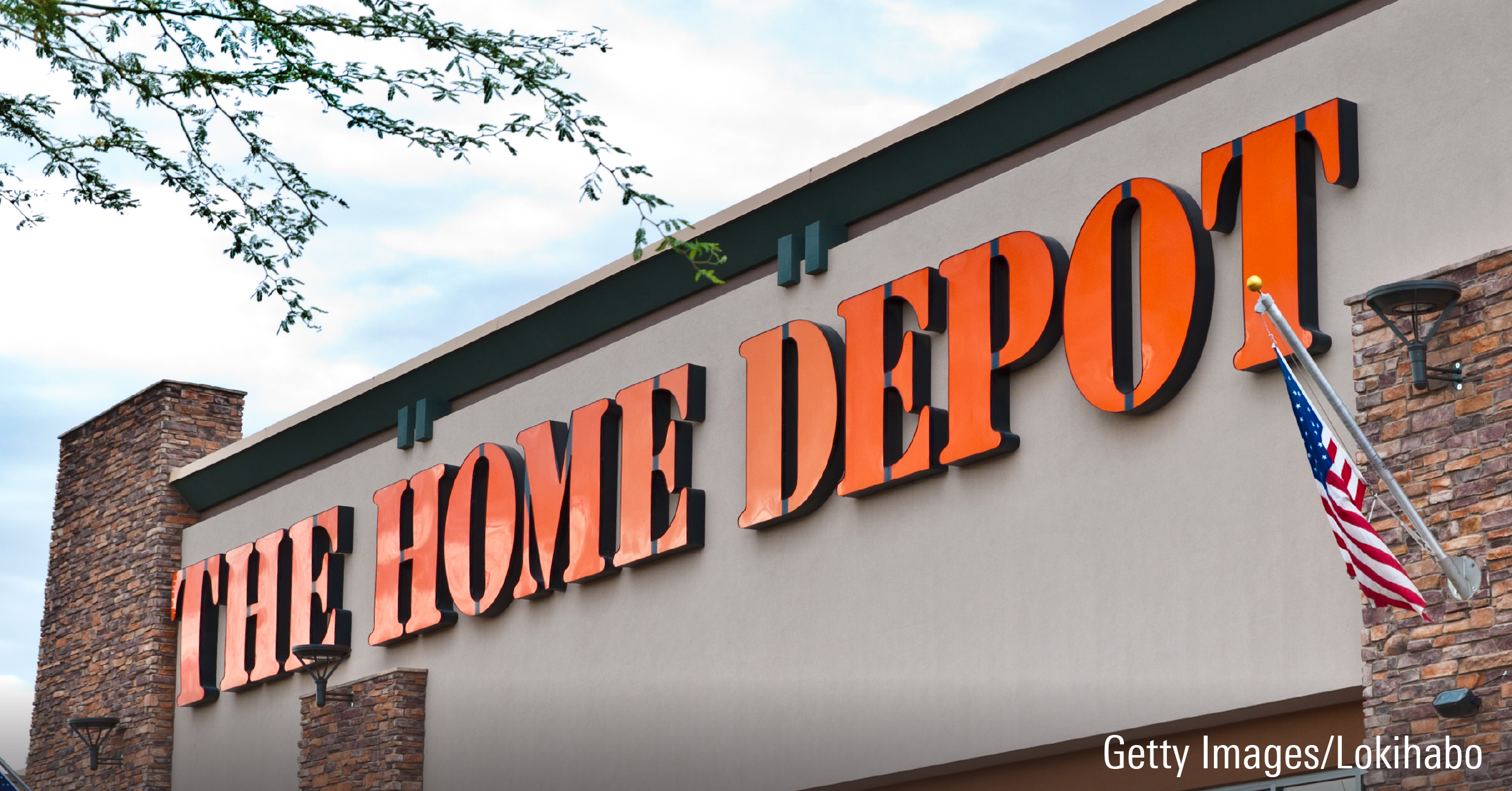After Earnings, Is Home Depot Stock a Buy, a Sell, or Fairly Valued?
With annual growth, category spending, and economic uncertainty, here’s what we think of Home Depot stock.

Home Depot HD released its second-quarter earnings report on Aug. 13. Here’s Morningstar’s take on Home Depot’s earnings and stock.
Key Morningstar Metrics for Home Depot
- Fair Value Estimate: $270.00
- Morningstar Rating: 1 star
- Morningstar Economic Moat Rating: Wide
- Morningstar Uncertainty Rating: Low
What We Thought of Home Depot’s Q2 Earnings
- Home Depot failed to escape weaker spending due to economic uncertainty in the second quarter. This surfaced in same-store sales declines of 3.3% (150 basis points lower than our estimate) and an organic sales downtick of 2.4% (excluding recently acquired SRS). Comp transactions fell 2.2% and the comp average ticket declined 1.3%.
- We think category spending has been increasingly paralyzed by the rising probability of interest rate reductions, as consumers wait to finance bigger-ticket projects at lower costs. While Morningstar anticipates the Federal Reserve’s initial rate cut will likely occur in September, we don’t expect an immediate stimulus to demand and believe big-ticket renovation growth will resume in 2025.
- The long-term algorithm for the firm’s annual growth is intact, as its opportunity set is still healthy. We view shares as rich, trading around 20 times our 2025 earnings per share estimate.
The Home Depot Stock Price
Fair Value Estimate for Home Depot
With its 1-star rating, we believe Home Depot’s stock is significantly overvalued compared with our long-term fair value estimate of $270. For fiscal 2024, we expect roughly $163 billion in sales (versus $154 billion prior), a 13.4% operating margin (14% prior), and $15.12 in EPS ($15.31). We raised our 2024 sales outlook by roughly $9 billion and our EBITDA by around $500 million, as we expect a roughly 80% contribution in the second quarter and full contributions from SRS in the back half of fiscal 2024 tempered by integration and acquisition expenses.
Read more about Home Depot’s fair value estimate.
The Home Depot Stock vs. Morningstar Fair Value Estimate
Economic Moat Rating
We assign Home Depot a wide moat rating. As the largest global home improvement retailer, Home Depot possesses a competitive edge owing to its brand intangible asset and cost advantage. Over the past 10 years, Home Depot’s sales growth has outpaced its industry’s average growth of 5.3% by 170 basis points annually. We surmise the company’s strong brand equity and extensive scale should enable incremental market share gains in the highly fragmented $950 billion North American home improvement market, on top of the 16% market share it has amassed thus far (given roughly $153 billion in sales in 2023).
Read more about Home Depot’s economic moat.
Financial Strength
Home Depot has had no concerns tapping the credit markets to finance the business in recent years. The firm raised $10 billion in debt during the first half of 2024 to finance part of its $18.25 billion acquisition of SRS Distribution. This should leave Home Depot with a total debt above $50 billion at the end of the second quarter. Management has halted share repurchases with higher expected debt service as a result of the pending acquisition. However, we model share repurchases to continue over the long run (with the new $15 billion share repurchase program authorized in August 2023). Including the impact of the SRS acquisition, EBIT is forecast to cover the net interest expense 11 times at the end of 2024.
Given Home Depot’s ability to generate tremendous free cash flow (we forecast an average of $22 billion in 2025-33), we expect management will have no problem facilitating dividend payments and remaining near its long-term dividend payout ratio target of 55%.
Read more about Home Depot’s financial strength.
Risk and Uncertainty
We give Home Depot a Low Uncertainty Rating, owing to its strong brand recognition, which has helped stabilize sales through the cycle. Sales are largely driven by greater consumer willingness to spend on category goods, with stable existing-home price growth and decent turnover. Thanks to the maintenance, repair, and operations business, pro revenue could be less cyclical, as the maintenance side can prove more consistent. In uncertain economic times, consumers remain in their homes, embarking on improvement projects and boosting do-it-yourself revenue. Alternatively, when home prices rise, the wealth effect generates a psychological boost, reinvigorating professional sales thanks to a higher willingness to spend on big projects. A diverse consumer base helps normalize revenue even in uneven times. Currently, about half of sales are in the do-it-yourself arena, while the rest is generated from the pro customer.
Read more about Home Depot’s risk and uncertainty.
HD Bulls Say
- Home Depot’s continued investments in supply chain and merchandising should improve productivity and support its leadership in the home improvement market.
- The company has returned $73 billion to shareholders through dividends and share buybacks over the past five years, nearly 20% of its market cap. In our outlook, we forecast Home Depot to return nearly $85 billion to shareholders over the next five years.
- The addressable MRO market is around $100 billion, and Interline and HD Supply make up a low-double-digit share, leaving meaningful upside up for grabs.
HD Bears Say
- Weak consumer spending, higher interest rates, or an economic downturn could hinder sales for home improvement projects and affect Home Depot’s growth.
- IT and supply chain improvement gains could prove more challenging to achieve, as simpler efforts have already borne fruit. Further productivity efforts could face some implementation risks, creating inconsistent profitability.
- As home improvement demand continues normalizing, consumers could shift discretionary spending away from home improvements into other discretionary categories.
This article was compiled by Renee Kaplan.
The author or authors do not own shares in any securities mentioned in this article. Find out about Morningstar’s editorial policies.

/s3.amazonaws.com/arc-authors/morningstar/3559e02b-f74d-4a72-a821-b50f61ba05e9.jpg)
/cloudfront-us-east-1.images.arcpublishing.com/morningstar/CFV2L6HSW5DHTFGCNEH2GCH42U.jpg)
/cloudfront-us-east-1.images.arcpublishing.com/morningstar/7AHOQA64TFEQDMYMIMM6VUHYLY.png)
/cloudfront-us-east-1.images.arcpublishing.com/morningstar/JA7LQ2INFNFTZFBJLSDUZGIPJQ.png)
:quality(80)/s3.amazonaws.com/arc-authors/morningstar/3559e02b-f74d-4a72-a821-b50f61ba05e9.jpg)